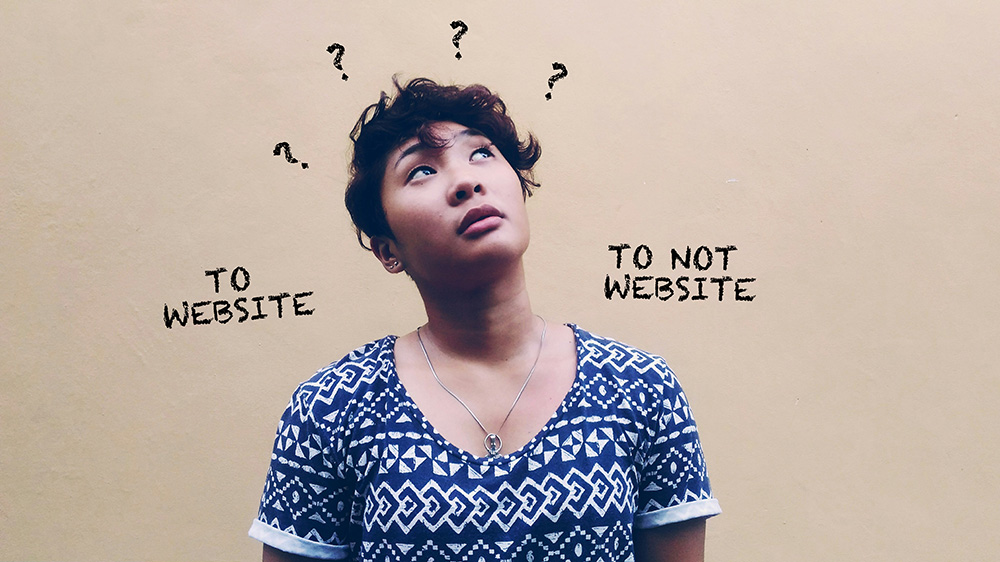Marketing isn’t a silver bullet. It’s not a flashy Instagram post or a viral TikTok…
I’m a small business owner, do I really need a custom website nowadays?

The dawn of the internet has long passed, and we’re deep into the digital age, yet the question still lingers for many small business owners: Do I need a custom website in 2024? The simple answer is yes, but let’s break it down and debunk the myths surrounding website design while exploring its true value for your small business.
Quick Facts
- 46% of small businesses in the US do not have a website.
- Small businesses that have websites grow 50% faster than those without online presence.
- 63% of small businesses rely on in-house resources for website maintenance.
- Small businesses with a blog see 126% more lead growth than those without a blog.
- Small businesses with websites witness an average revenue growth of 34% compared to those without websites.
The pros of investing in a custom website
- Unique Branding
A custom website is like your business card, storefront, and billboard rolled into one. It’s the first impression your customers get, and you want it to be a good one. Imagine a restaurant with a neon sign that flickers on and off versus one with a sleek, well-lit entrance. Which one are you more likely to trust with your dinner plans? A custom website ensures your brand is represented accurately and professionally, setting you apart from the cookie-cutter templates that scream “generic.” - Better User Experience (UX)
Ever tried navigating a website that feels like a maze designed by a sadistic hamster? A custom website allows you to tailor the user experience to your audience’s needs, making their journey through your site as smooth as a glass of fine whiskey. Good UX design means faster loading times, intuitive navigation, and a layout that guides your visitors exactly where you want them to go, whether it’s your product page, contact form, or blog. - SEO Optimization
You can have the best-looking site on the web, but if it’s not optimized for search engines, it’s like opening a five-star restaurant in the middle of nowhere. Website design tailored to SEO means structuring your site to rank higher on search engine results pages (SERPs). This includes everything from mobile responsiveness to keyword integration (like “website design” – see what I did there?), ensuring your potential customers can find you easily. - Scalability and Flexibility
A custom website can grow with your business. Need to add an e-commerce section? No problem. Want to integrate a new booking system? Easy peasy. A bespoke site offers the flexibility to expand and adapt as your business evolves, unlike many pre-made templates that can be as rigid as a rock. - Security
In an age where cyber threats lurk around every digital corner, security is paramount. Custom websites are generally more secure because they can be built with the latest security protocols and practices. This means less worry about data breaches and more focus on running your business. - Credibility and Trust
Think about it: if you land on a website that looks like it was designed in the ’90s, how likely are you to trust that business with your credit card information? A modern, custom website instills confidence in your customers, showing them you are legitimate, professional, and invested in your business.

“If your business is not on the internet, then your business will be out of business.” – Bill Gates
The cons of investing in a custom website
- Initial Cost
Let’s not beat around the bush – custom websites aren’t cheap. The upfront investment can be significant, especially for a small business operating on a tight budget. However, this cost can be seen as a long-term investment rather than a short-term expense. The returns, in terms of customer trust and sales, often outweigh the initial outlay. - Time-Consuming Process
Building a custom website is like slow-cooking a stew; it takes time. You’ll need to work closely with your designer to ensure every detail is just right. This process can be lengthy and requires patience. However, the end result is a site that perfectly matches your vision and goals. - Maintenance and Updates
A custom website requires ongoing maintenance to keep it running smoothly and securely. This can mean additional costs and the need for technical know-how. Regular updates and monitoring are essential to keep the site performing at its best. - Overwhelming Choices
The world of custom website design offers a dizzying array of options. From layout and color schemes to plugins and integrations, the sheer number of choices can be overwhelming. This is where having a good designer or consultant comes in handy – they can help you navigate these decisions and keep the project on track. - Possible Overkill for Very Small Businesses
If you’re a one-person operation or your business is extremely niche, a full-blown custom website might be more than you need. In some cases, a well-designed template could suffice, especially if you’re just looking for a simple online presence.
Conclusion
Nowadays, a custom website is more than just a digital business card; it’s a critical tool for establishing your brand, improving user experience, and boosting your online presence. While the initial cost and time investment can be significant, the long-term benefits often make it worthwhile. Consider your specific needs, budget, and business goals when deciding whether a custom website is right for you. In most cases, the pros outweigh the cons, and investing in a custom website can be a game-changer for your small business. What do you think?


